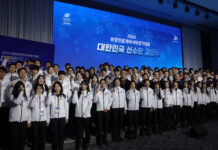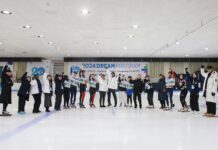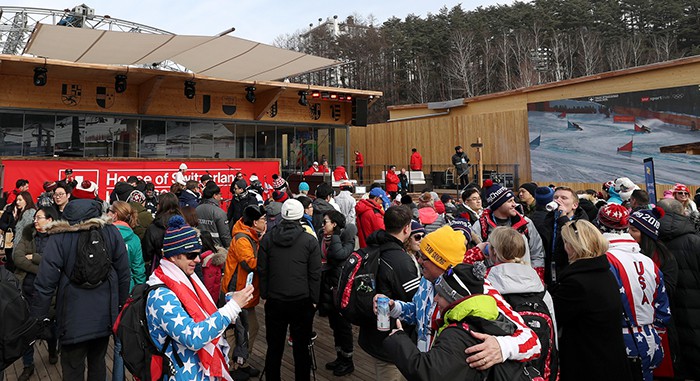
Visitors to the House of Switzerland in Pyeongchang, Gangwon-do Province, take pictures of themselves while an Olympic event is live-streamed on Feb. 24
By Korea.net PyeongChang Olympics Team
Photos = Jeon Han and Kim Sunjoo
Pyeongchang l Feb. 24, 2018
“Hospitality is the key to PyeongChang success!”
This is the common thought from managers running the world’s national pavilions in both Pyeongchang and Gangneung, Gangwon-do, where the PyeongChang 2018 Olympic Winter Games have been underway since Feb. 19.
The national pavilions, or houses, are venues that promote each Olympic participant’s cultural heritage, traditions and history, to both Korean and non-Korean visitors alike, and they also serve the nation’s athletes during their stay in Korea.
Managers at the houses have all agreed that thanks to the kindness that the Korean people have shown to the world in Pyeongchang, the Olympic Games have been successful.
Manuel Salchli, director at the House of Switzerland in Pyeongchang, said, “There are many very, very sweet and kind volunteers. The Korean people are very friendly. They always try to help if they can. That’s the factor that makes the Games successful. Everything is well-organized.”
He then continued. “What’s special to me about PyeongChang is that there are not many new hotels, so Korea is trying to host sustainable Games. They didn’t build hotels that won’t be used after the Games. What I appreciate about PyeongChang is that they built an Olympic stadium in Pyeongchang and they will take it down, so that they don’t have a ruined stadium standing here.”
Sara Gottfarb, marketing manager at Sweden House, also found the reason for PyeongChang success to be in the “people.
“A lot of people are very friendly and happy here. It feels very close to everything, from the people and the sports to the athletes. The facilities are very close, too. It’s very close, everywhere,” she said.
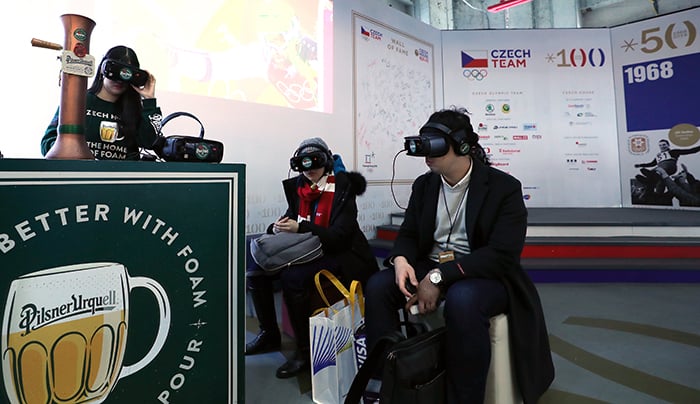
Visitors to Czech House, located near the athletes’ village in Gangneung, Gangwon-do Province, experience beer brewing in virtual reality on Feb. 24.
Some other national houses, run by Eastern European countries in Gangneung, had the same reason for PyeongChang success.
“Many non-Korea visitors to our house who desired to drink the country’s signature beer are impressed by the way we serve them with smiles and hospitality,” said Kim Jae-seung, director at Czech House. “Thanks to the devotion shown by such volunteers and officials from the Organizing Committee, the PyeongChang Games are coming to an end successfully.”
Robert Lobovsky, a Czech beer master, said that, “What impressed me the most is all the friendly Korean people I’ve met.”
Some people, however, expressed some disappointment, too.
Zorka Hujsova, who manages Slovak House, agreed on the hospitality of the Korean people, but felt sorry that, “Only near the Gangneung venues and the athletes’ village can you feel the festive mood, but not in other places far from there.”
There are a total of 17 national houses open in the Olympic host cities of Pyeongchang, Gangneung and Jeongseon. Some are open with no admission fee, and others have a small entrance fee. Some houses, also, are operated behind closed doors and are only for Olympic officials, athletes or national team members.
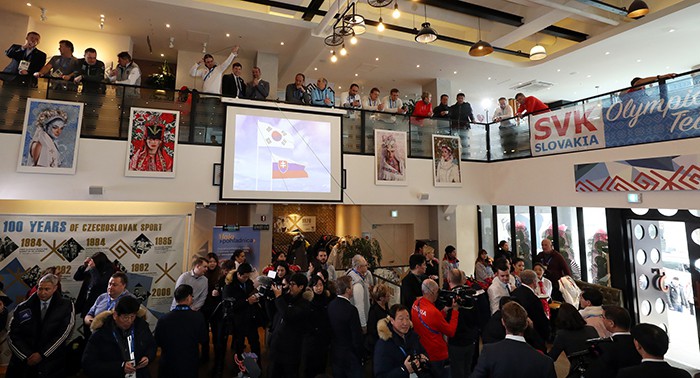
Visitors from all around the world come and experience Slovak heritage during the Opening Ceremony of Slovak House, in Gangneung, Gangwon-do Province, on Feb. 10.
kyd1991@korea.kr




